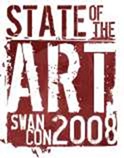Home » Call for Papers
Category Archives: Call for Papers
CFP: ‘Beginnings’
 Bjorn Nansen and I are editing an issue of M/C A Journal of Media and Culture on the (deliberately and we hope, provocatively) broad topic of ‘Beginnings’. The Call for Papers has just been released, and is reproduced below for your convenience:
Bjorn Nansen and I are editing an issue of M/C A Journal of Media and Culture on the (deliberately and we hope, provocatively) broad topic of ‘Beginnings’. The Call for Papers has just been released, and is reproduced below for your convenience:
‘beginnings’
The digital spaces we encounter are increasingly stabilised and structured, organised through regulatory and commercial regimes, and populated by content and users whose lives began already networked in digital forms of production, distribution and consumption. This issue of M/C Journal seeks to explore the beginnings of these familiar and well-established, as well as emerging, contexts of digital cultures. By focussing on the beginnings, of life, of platforms, of technological encounters, of existence on social media, and so on, this issue aims to bring together scholarship around the infant and initial moments of technology use, and the processes, relations and forces that shape and are shaped by these beginnings. As digital culture becomes increasingly banal and thus less visible, studying digital beginnings may help to illuminate the varied forms of meaning, mediation, and materiality at play in configuring the familiar. Exploring beginnings may also serve to highlight paths not taken, as well as potential alternatives produced at such interstices.
Questions of beginnings feature within research traditions and theories of technology adoption, domestication and development, and so can be understood in reference to individuals and users, but also apply to the beginnings of social groups and movements, or the birth of applications, platforms, technologies or enterprises. Studying beginnings, therefore, raises questions about digital histories, trajectories and temporalities, and is open to empirical, methodological or theoretical enquiries.
By inviting contributions interested in exploring digital beginnings in this issue of M/C, possible topics to be addressed may include, but are not limited to:
- The mediation of the unborn and newly born
- New parents and social media platforms
- Case studies or examples of infant media use
- Newbs and noobs in gaming or online communities
- The cultural implications of new forms of computational interfaces (e.g. the Internet of Things)
- Myths of new beginnings and technological exceptionalism (e.g. 3D printing)
- Early historical perspectives on digital media industries or events
- Start-up spaces or cultures
- Alternate beginnings (eg failed and forgotten inventions)
Prospective contributors should email an abstract of 100-250 words and a brief biography to the issue editors. Abstracts should include the article title and should describe your research question, approach, and argument. Biographies should be about three sentences (maximum 75 words) and should include your institutional affiliation and research interests. Articles should be 3000 words (plus bibliography). All articles will be refereed and must adhere to MLA style (6th edition).
Details
- Article deadline: 14 Aug. 2015
- Release date: 14 Oct. 2015
- Editors: Bjorn Nansen and Tama Leaver
Please submit articles through this Website. Send any enquiries to beginnings@journal.media-culture.org.au.
Needless to say, enquiries are welcome, and early submissions, too!
[Image: 4/366: Beginning by Magic Madzik CC BY]
CFP: An Education In Facebook?
Along with my colleagues Mike Kent and Clare Lloyd we’re working on an edited collection about the joys, perils and uses of Facebook in higher education (of any sort). Here’s the CFP (call for papers) if you’re interested. Please feel free to distribute this post wide and far if you’d be so kind!
An Education in Facebook?
Higher Education and the World’s Largest Social NetworkEditors: Dr Mike Kent, Dr Tama Leaver and Dr Clare Lloyd, Internet Studies, Curtin University
Abstract Submission Deadline 18 January 2013
Full Chapters Due 31 May 2013
We are soliciting chapter proposals for an edited collection entitled An Education in Facebook? This edited collection will focus on the relationship between Facebook and Higher Education. Facebook first emerged in 2004 as a social network for students studying at universities in the United States. It soon grew beyond North America, and beyond the confines of student networking. Having evolved initially as a student social space the platform continues to play a prominent role in the lives of many students and staff at higher education institutions.
The collection will explore the use of Facebook the higher education environment as both a social space, and also its growing use as part of teaching and learning processes, both formally and informally. From students creating informal social groups around a course of study or particular unit, and dedicated online study groups, to the use of Facebook as a formal venue for teaching, we are seeking chapters that explore these and related areas.
Is there an appropriate place for Facebook in formal higher education? What are the tensions between private and professional spaces online for students and teachers and what are the potential dangers of unintentional overlap? What are appropriate roles and responsibilities for staff, students and institutions in relation to the social network? What are the dangers of moving important aspects of the higher education learning environment to an external company that exploits social interaction for profit? How is the shift to online learning in many institutions complemented or challenged by mobile uses of social networks, including app use on smartphones and tablets? This book will explore these and other topics interrogating the contemporary role of Facebook in Higher Education.
Some suggested topics (which are by no means exhaustive):
- · Facebook and/as/or Learning Management Systems?
- · Facebook as support network (for online and overseas learners, for example)
- · Teacher-led Facebook uses as in/formal learning
- · Student-led Facebook uses as in/formal learning
- · Case studies of Facebook implementation in formal learning
- · Informal versus formal learning online
- · Social networks and the flipped classroom
- · Context collapse
- · Privacy issues in social network use
- · Copyright issues in social network use
- · Mobile learning
- · The Facebook App in education
- · Roles and boundaries in networked learning
- · Facebook as a backchannel (either positive or disruptive)
- · The politics of ‘friending’ in staff and student relations
- · Examples of innovative Facebook integration in higher education
- · Whether Facebook has a place in formal education
- · MOOCs and Facebook
- · Comparative uses of Facebook and other online networks (eg Twitter)
Submission procedure:
Potential authors are invited to submit chapter abstract of no more than 500 words, including a title, 4 to 6 keywords, and a brief bio, by email to both Dr Mike Kent <m.kent@curtin.edu.au> and Dr Tama Leaver <t.leaver@curtin.edu.au> by 18 January 2013. (Please indicate in your proposal if you wish to use any visual material, and how you have or will gain copyright clearance for visual material.) Authors will receive a response by February 15, 2013, with those provisionally accepted due as chapters of no more than 6000 words (including references) by 31 May 2013.
About the editors:
The three editors are from the Department of Internet Studies at Curtin University. Dr Mike Kent’s research focus is on people with disabilities and their use of, and access to, information technology and the Internet. He recently co-authored the monograph Disability and New Media (Routledge, 2011). His other area a research interest is in higher education and particularly online education. Dr Tama Leaver researches online identities, digital media distribution and networked learning. He previously spent several years as a lecturer in Higher Education Development, and is currently also a Research Fellow in Curtin’s Centre for Culture and Technology. His recent book is Artificial Culture: Identity, Technology and Bodies (Routledge, 2012), and he is currently co-authoring a monograph entitled Web Presence: Staying Noticed in a Networked World. Dr Clare Lloyd specialises in mobile communication and mobile media. Her recent publications include the co-authored papers ‘Consuming apps: the Australian woman’s slow appetite for apps’ (2012); and ‘Fun and useful apps: female identity construction and social connectedness using the mobile phone’ apps’ (2012).
State of the Art: Science Fiction Histories (Perth, Western Australia, 22 & 23 March 2008)
 CALL FOR PAPERS – STATE OF THE ART: SCIENCE FICTION HISTORIES
CALL FOR PAPERS – STATE OF THE ART: SCIENCE FICTION HISTORIES
Perth, Western Australia, 22nd-23rd March 2008
In his recent history of the genre, Roger Luckhurst argues that the marginalisation of Science Fiction (SF) from the literary establishment helped readers and writers to identify its conventions. Fandom blossomed from this liminal space, its culture providing a unique history of the relations between texts and their readers. While fans were the first historians of SF, other communities have since established their own versions of the genre. The rise of national SF in countries such as Brazil and the old Soviet Union, China and Japan de-centre its Anglo-American bias. Feminist and queer writers work to unravel its phallocentrism and heterosexism. Histories of black and Aboriginalist fiction point out the political uses of the form. The genre has itself been shaped by its reception by these communities. In Anglo-American SF, the genre’s intimacy with fandom has transformed the way its fiction (and history) has been written. It is with a view to thinking through such developments that this symposium seeks work on what SF has been to different audiences at different times, on rewriting generic history to arrive at a better understanding of the state of the art today.
Papers are invited on the following or related topics:
[X] Histories of the SF community
[X] Intersections and interactions between fan and popular cultures, and between fandom and the general public.
[X] Political histories in SF, such as Marxist, anarcho-capitalist, etc
[X] Intersection of SF with feminist & queer theories
[X] Postcolonial approaches to SF
[X] National histories of SF
[X] Non-Anglo-American traditions of SF
[X] History of race in SF
[X] The collapse of genre: slipstream, new weird, etc
Sponsored by Curtin University of Technology, the symposium will be held as part of State of the Art: Swancon 2008, the National Australian convention of science fiction, fantasy and horror.
SPEAKERS
Swancon 33 guests of honour are:
[X] Ken McLeod (Scotland)
[X] Paul Cornell (UK)
[X] Glenda Larke
[X] Zara Baxter
Confirmed Speakers for the Symposium are:
[X] Mark Bould (The University of the West of England)
[X] Andrew Milner (Monash University)
[X] Sylvia Kelso (James Cook University)
[X] Stephen Dedman (University of W.A.)
SUBMISSIONS
Submissions are sought for both individual papers and panel presentations.
Papers –submit 300-500 word abstract
Panels – submit 300 word description of the panel theme and short abstracts / details of panel participants
PUBLICATION OF PAPERS
Selected papers from the symposium will be published in a special journal issue. To be considered for publication, draft papers must be submitted before the symposium.
DEADLINES
Abstracts due: December 7. 2007
Draft papers (for publication) due: March 14, 2008
CONTACTS
Sonia Marcon, Swancon Academic Stream
Darren Jorgensen, Media, Society & Culture, Curtin University of Technology
Helen Merrick, Media, Society & Culture, Curtin University of Technology
Email: sciencefictionhistories@gmail.com
Website: http://www.swancon.com/

